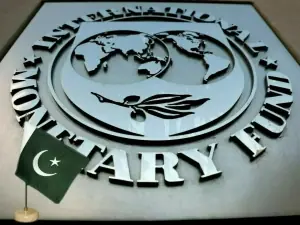Budget 2025-26: FBR sets tax collection target of Rs14,131 billion, economic growth posits at 4.2%
10 min readBudget session for the approval of Finance Bill 2025-26 commenced on Tuesday as Speaker National Assembly Sardar Ayaz Sadiq presided over the special session.
Finance Minister Senator Muhammad Aurangzeb presenting the Finance Bill 2025-26 in the National Assembly.
The National Assembly session began with special prayers for the peace and prosperity of the country.
Finance Minister said, “This budget is being presented during a historic moment, as the country pressed on through difficult times.”
“The spirit with which we protected our national sovereignty, we need to ensure our financial security in the same way,”
In his budget speech, Aurangzeb lauded the political and military leadership for their “valiant stand” against “Indian aggression,” extending congratulations to both. He asserted that a “strong and effective response” was given to the enemy, which has “elevated Pakistan’s prestige in the international community.”
Economic turnaround: Inflation down, remittances up
Shifting focus to the economic outlook, the Finance Minister emphasised the government’s commitment to “economic stability and development” and “ensuring public welfare.” He stated that the nation has “successfully embarked on a journey of reforms and development,” with a priority on creating an economy that “facilitates every segment of society.” Aurangzeb also noted that “several measures were undertaken last year to improve the economy.”
He announced that inflation has dropped to 4.7%, a stark contrast to the 29.2% it had reached just two years ago.
He reported a substantial increase in remittances, which have reached $31.2 billion. Looking ahead, Aurangzeb projected that the total volume of remittances for the current fiscal year would reach between $37 billion and $38 billion, underscoring the vital contribution of overseas Pakistanis to the national economy.
He projected that foreign exchange reserves will reach $14 billion by the end of the current fiscal year.
The Minister also highlighted a positive trend in the Business Confidence Index, indicating a growing optimism within the business community.
Aurangzeb announced that Fitch Ratings has upgraded Pakistan’s rating from ‘CCC+’ to ‘B-’, reflecting an improved economic outlook.
Starting July 1st, the current 800-column tax return will be replaced with a simplified format. This new, user-friendly return will require only seven basic pieces of information, making it considerably easier for small businesses to comply with tax regulations.
He highlighted a concerning estimated tax gap of Rs5,500 billion, terming this situation as “unacceptable.”
To combat this, he announced the initiation of digital production tracking for cement, fertiliser, beverages, and textiles. Furthermore, an AI-based system for sales and income tax is being introduced to enhance revenue collection and compliance.
Tackling tax evasion and boosting revenue
He also revealed that 390,000 non-filers have been identified, indicating a more robust approach to tax enforcement. The Federal Board of Revenue (FBR) has already collected 78.4 billion rupees in additional revenue.
The Minister also provided an update on the government’s privatisation agenda, stating that the process for three distribution companies has been half-completed.
He reaffirmed that the renegotiated agreements with Independent Power Producers (IPPs) are projected to yield savings of an impressive Rs3,000 billion.
Minister also highlighted a substantial reduction in the losses of electricity distribution companies, reporting a Rs140 billion decrease in losses over the past nine months.
He assured the nation that the government has undertaken “comprehensive planning for acquiring cheap electricity,” which will be “possible in the coming days.”
In a major policy shift, Aurangzeb announced that all government-owned power generation plants have been shut down, a move expected to eliminate an annual burden of Rs7 billion on the national exchequer.
On the exploration front, the Finance Minister announced multiple oil and gas discoveries across the country, which he stated have significantly “improved energy security.”
He further revealed that Exploration and Production (E&P) companies have expressed their commitment to invest in oil and gas exploration, with these companies “vowing to invest $5 billion.”
Reko Diq project to be a “Game Changer” with enhanced infrastructure
Aurangzeb also underscored the importance of the Reko Diq copper and gold mines, terming them a “crucial asset” for the nation.
He stated that the projected mining period for this mega-project is an impressive 37 years. Over this duration, the country is expected to receive cash flows exceeding $75 billion, positioning Reko Diq as a cornerstone for long-term economic growth and stability.
He announced that the construction of road and rail infrastructure connecting Reko Diq to Port Qasim and Gwadar is currently underway.
The maximum customs duty limit has been set at 15 per cent.
The Minister confirmed that preparations for the first-ever Panda Bond have been completed. This will allow Pakistan to raise capital directly from China’s bond market.
Government continues rightsizing and prioritizes climate financing
Aurangzeb revealed that the Cabinet has approved the rightsizing of 10 ministries. Additionally, six divisions have been merged into three.
Finance Minister emphasised that the government has given “special attention to climate financing.” He projected that Pakistan will have access to $40 billion in resources over the next 10 years for climate-related endeavours.
Pension reforms Introduced to ensure fiscal sustainability
The government will now discourage premature retirements.
Minister stated that family pensions will be limited to 10 years after the demise of the spouse. He also announced the elimination of multiple pensions for individuals, a measure designed to improve fiscal efficiency. Additionally, if an individual is re-employed after retirement, they will be required to choose between receiving their pension or their salary.
Pakistan eyes $25 Billion IT exports, boosts SME financing
Minister reported that IT exports reached $3.1 billion in the last 10 months, and the government has set an ambitious plan to achieve $25 billion in IT exports over the next five years.
Regarding SMEs, Aurangzeb noted a substantial increase in financing, which has risen from 471 billion rupees to 641 billion rupees.
The government aims to increase SME financing to Rs1,100 billion by 2028, with the goal of benefiting 750,000 businesses.
Government unveils initiatives for overseas pakistanis
To acknowledge the vital contribution of overseas Pakistanis, the Finance Minister announced that civil awards will be conferred upon the top 15 individuals who send the highest remittances.
Minister revealed that special courts are being established for Pakistanis residing abroad to address their legal concerns more efficiently. Additionally, an online system for case registration is being introduced, which will streamline the judicial process for expatriates.
In a move to support the education of overseas Pakistanis’ children, Aurangzeb stated that quotas are being allocated in universities and medical colleges for them.
Empowering small farmers: collateral-free loans and deed development authority
He stated that the government will provide collateral-free loans of up to Rs100,000 to small farmers. These funds will be directly transferred to the farmers’ e-wallets, ensuring efficient and transparent disbursement.
Minister also announced the establishment of a National Seed Development and Authority.
Pakistan sets ambitious economic growth target, projects lower inflation and deficit
He announced that the target for economic growth is set at 4.2%. The average inflation rate is expected to moderate to 7.5%.
The Minister also shared optimistic figures for fiscal management, projecting the budget deficit to be 3.9% of GDP and a primary surplus of 2.4% of GDP.
Ambitious revenue targets and significant allocations for development, defense, and social programs
The Federal Board of Revenue (FBR) has been set a formidable tax collection target of Rs14,131 billion. The Minister announced that the total estimated expenditures for the federal government will be Rs17,573 billion.
Federal Public Sector Development Program (PSDP) has been allocated Rs1,000 billion, with Rs328 billion specifically earmarked for transport infrastructure.
This includes Rs100 billion for the Karachi-Chaman dual carriageway and Rs15 billion for the Sukkur-Hyderabad dual carriageway. Additionally, Rs35.7 billion will be allocated for the Mohmand Dam. Overall, national development expenditures are earmarked at Rs4,224 billion.
Defence spending will amount to Rs2,550 billion, while Rs1,055 billion have been allocated for pension expenses.
Furthermore, the vital Benazir Income Support Program (BISP) has been allocated Rs716 billion, reinforcing the government’s commitment to social welfare.
Pakistan prioritizes water security amidst Indian threats, boosts water storage and energy initiatives
Finance Minister Muhammad Aurangzeb, during his budget address, addressed the critical issue of water security, directly referencing India’s threats to halt Pakistan’s water supply. He declared that Pakistan would “effectively counter India’s nefarious designs” and emphasised the urgent need to “increase water reservoirs on a war footing.”
Aurangzeb announced ambitious targets for water storage, stating that 10 million acre-feet of water storage will be added. Furthermore, measures will be implemented to reduce water wastage by 33%.
For the development and management of water resources, the Water Resources Division has been allocated Rs133 billion. A sum of Rs4.4 billion has been earmarked for the telemetry system on the Indus Basin System. The Minister also specifically allocated Rs3.2 billion for four projects related to the Karachi Bulk Water Supply, aiming to address the city’s water needs.
In the energy sector, Aurangzeb confirmed that 90.2 billion rupees have been allocated for 47 energy sector schemes
Investing in human capital, science
300 agricultural graduates will travel to China this month for training or collaborative programs.
For higher education, the Higher Education Commission (HEC) has been provided Rs39.5 billion for 170 projects. Additionally, Rs4.8 billion have been allocated for 31 schemes in science and technology, underscoring the government’s focus on innovation.
New tax brackets for salaried individuals announced
He announced that those earning up to Rs1.2 million annually will face a 1% tax rate, meaning an individual with a Rs1.2 million income will pay an estimated Rs6,000 in tax.
For higher income brackets, the Minister stated that individuals earning Rs2.2 million will be subject to an 11% tax rate. This 11% rate will also apply to those earning between Rs2.2 million and Rs3.2 million.
Aurangzeb also projected that the tax-to-GDP ratio for the current fiscal year will reach 12.3%.
Budget proposes surcharge reduction to combat brain drain, super tax cut for corporations
To address the issue of “brain drain,” the Minister proposed a 1% reduction in surcharge for individuals earning over 10 million rupees annually. This initiative is designed to incentivize highly qualified individuals to remain and contribute to Pakistan’s economy.
For corporations, Aurangzeb announced a proposed 0.5% reduction in the super tax, a move that is expected to provide some relief to businesses and encourage investment.
Sweeping tax reforms announced
He stated the government is introducing an income tax classification system that will effectively “eliminate the distinction between filers and non-filers.”
Under this new system, only those who submit a wealth statement will be able to conduct financial transactions. This includes critical activities such as opening bank accounts and buying and selling vehicles.
The Minister also outlined new tax measures impacting various sectors. Imported solar panels will now be subject to an 18% sales tax.
Similarly, e-commerce courier and logistics service providers will also face an 18% tax. Additionally, all vehicles will be subject to an 18% tax.
Aurangzeb further revealed plans to gradually impose taxes on all newly merged districts. For unregistered businesses, the Minister issued a stern warning: their “days are numbered.”
He announced that penalties for unregistered businesses will increase, and such businesses could face actions including sealing of their operations and freezing of their accounts.
Property tax adjustments, new tax on mutual funds and high-income pensioners, and advance tax for non-filers
The withholding tax will be lowered from 4% to 2.5%, from 3.5% to 2%, and from 3% to 1.5%, depending on the specific property transaction. Furthermore, the 7% excise duty currently levied on properties, plots, and houses is proposed to be abolished. To support residential construction, a tax credit is proposed for houses up to 10 marlas and flats up to 200 square feet.
In a move that could potentially stimulate the real estate market, the Minister proposed a reduction in withholding tax on property purchases. The withholding tax will be lowered from 4% to 2.5%, from 3.5% to 2%, and from 3% to 1.5%, depending on the specific property transaction. Furthermore, the 7% excise duty currently levied on properties, plots, and houses is proposed to be abolished. To support residential construction, a tax credit is proposed for houses up to 10 marlas and flats up to 200 square feet.
For investments, a 25% tax is proposed on income derived from mutual funds. Regarding pensions, the Minister stated that pensioners under 70 years of age with an annual income exceeding 10 million rupees will be subject to a 5% tax.
In an effort to encourage tax compliance, Aurangzeb announced that non-filers will face a 1% advance tax on cash withdrawals.
He announced that penalties for unregistered businesses will increase, and such businesses could face actions including sealing of their operations and freezing of their accounts. These measures underscore the government’s determination to bring all economic activity under the tax regime. The Minister, however, clarified that individuals affected by these actions will be given an opportunity for a hearing and will have the right to appeal within 30 days.
For the latest news, follow us on Twitter @Aaj_Urdu. We are also on Facebook, Instagram and YouTube.

























Comments are closed on this story.